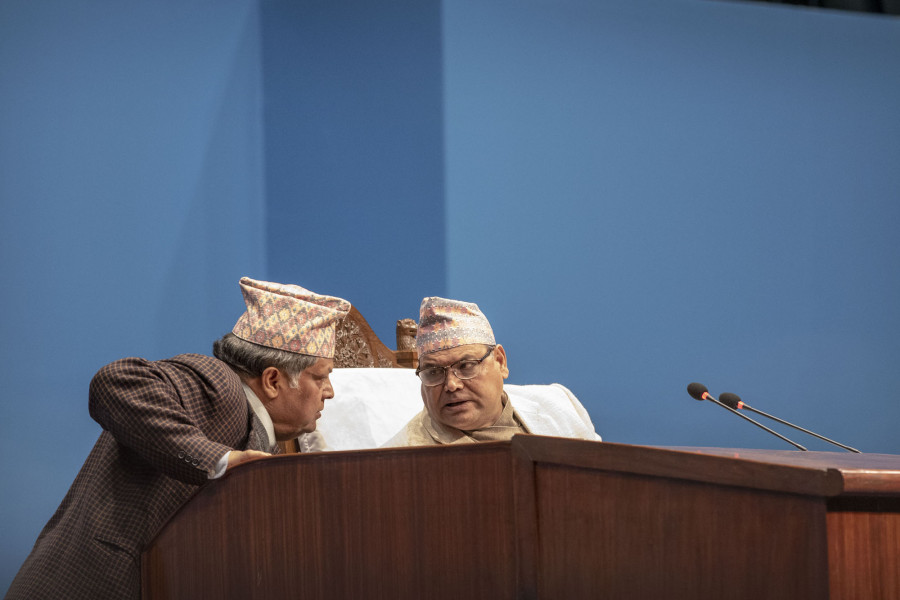Politics
Even as lawmakers are accused of heinous crimes, Parliament remains without a disciplinary committee
The Speaker, who is responsible for forming such committees, himself remains in judicial custody after being accused of rape.
Binod Ghimire
While over half a dozen Members of Parliament are being investigated for criminal matters, the House committee mandated to look into such cases hasn’t been formed, nearly two years since the commencement of the federal parliament.
Rule 217 of the Regulation of the House of Representatives envisions a Conduct Monitoring Committee led by the Speaker to investigate if any questions are raised over the conduct of lawmakers or when complaints are filed against them. The 13-member committee has the power to investigate such cases and recommend action before the full House if it concludes that lawmakers have indulged in immoral and illegal conduct.
Although the Speaker bears the responsibility to form the committee, Krishna Bahadur Mahara, the immediate past Speaker, never took the initiative. And in what some might call the biggest irony, Mahara, who should be leading the monitoring committee, is himself in judicial custody after he was accused of raping an employee who worked at the Parliament Secretariat.
“The Speaker has to table a proposal to form the committee, but no step to this effect has been taken so far,” Roj Nath Pandey, spokesperson for the Parliament Secretariat, told the Post. “We will draw the attention of the new Speaker once the House gets a new leader.”
The election of the new Speaker will take place during the winter session of Parliament, but it is uncertain just when the session will begin.
Those who drafted the regulation say that the committee has even more significance at the moment as numerous lawmakers have been accused of criminal activities.
“It is sad to see that the committee doesn’t exist when it has a huge role to play,” Krishna Bhakta Pokharel, the coordinator of the regulation drafting committee, told the Post.
Currently, around a dozen cross-party lawmakers are under investigation for criminal and civil offences. Rastriya Janata Party Nepal lawmaker Resham Chaudhary was suspended after he was convicted for masterminding deadly violence in Tikapur, Kailali, in August 2015. Similarly, Hari Narayan Rauniyar, a Member of Parliament from the Samajbadi Party Nepal, has been suspended on corruption charges. Nepali Congress lawmaker Mohammad Aftab Alam, who is facing charges of mass murder, remains in judicial custody.
Parbat Gurung, a member of the Lower House from the Nepal Communist Party (NCP), and Rastriya Janata Party lawmaker Pramod Sah are out on bail while police are investigating criminal charges.
“Had the committee been in place, it would have conducted an impartial investigation into matters and made its position public,” said Pokharel.
Officials at the secretariat said that a few lawmakers had raised the issue after the corruption case against Rauniyar, owner of the notorious Pappu Construction. However, the Speaker didn’t feel it necessary, nor did other lawmakers, they said.
“I believe the respective parties would have felt the pressure to take action against their lawmakers if the committee, which would have their participation, found their involvement in illegal activities,” said a secretariat official on condition of anonymity because he feared retribution.
No parties have suspended membership of their lawmakers, even though some are facing charges for heinous crimes, including mass murder and rape.
Political analysts who have closely followed parliamentary proceedings say that they don’t remember such committees ever being formed. Past parliamentary regulations also had such provisions, but the monitoring committees were never formed.
“Envisioning such committees in the regulation is not enough. They must be formed for them to work,” Birendra Karki, a former parliament secretary, told the Post. “But our leaders have never realised the necessity of such committees.”




 9.83°C Kathmandu
9.83°C Kathmandu














